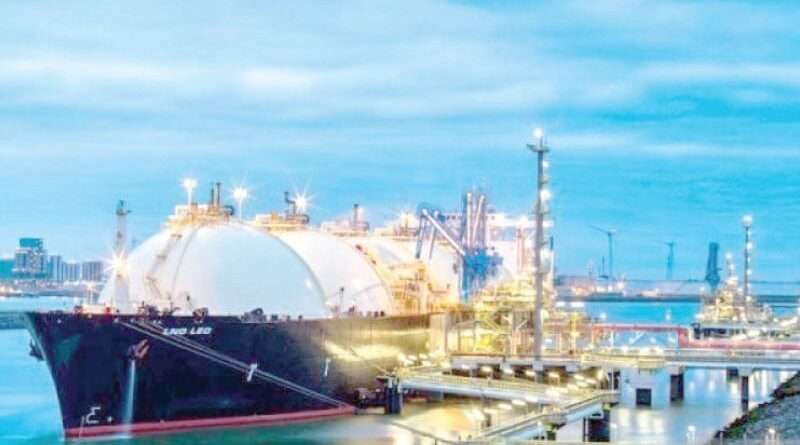LNG Imports Impact Local Energy Industry: Oil and Gas Firms Face Losses
|
Getting your Trinity Audio player ready...
|
The Pakistani oil and gas industry is once again grappling with the consequences of importing liquefied natural gas (LNG). Over the past four months, exploration companies in the country have incurred substantial financial losses as a result of LNG being added to the national transmission system. The situation has sparked concerns among industry stakeholders and raised questions about the sustainability of this energy strategy.
Impact of LNG Imports on Local Oil and Gas Industry
The decision to import LNG has created a ripple effect in Pakistan’s energy sector, significantly affecting domestic oil and gas production. The addition of LNG to the transmission system has resulted in gas curtailments from local fields. Exploration companies, which rely on steady production from these fields, have been particularly hard-hit by the supply cuts.
The Economic Toll on Exploration Companies
The total curtailment of gas supply has amounted to 329 million cubic feet per day (mmcfd). This reduction in local gas production has resulted in a monthly loss of approximately $48 million for oil and gas companies. Over the span of four months, this translates to a staggering loss of $192 million.
Local energy companies, including key players such as MOL Group, Oil and Gas Development Company (OGDC), and Pakistan Petroleum Limited (PPL), have reported significant financial setbacks. The curtailment of gas supply has led to halted crude oil production, which has in turn caused an impact of Rs5 billion in losses.
According to industry sources, the value of the 329 mmcfd of imported LNG over the four-month period is estimated at $500 million. These curtailments are not only leading to substantial financial losses for companies but are also impacting the national exchequer due to a lack of tax recovery, with losses amounting to Rs20 billion.
The Toll on National Energy Production
The curtailment of local gas production has been particularly concerning for Pakistan’s energy sector. The country relies on indigenous gas fields to meet its energy demands. However, with LNG imports taking precedence in the transmission system, critical gas fields are being curtailed at a rapid pace. Some of the fields affected include:
- Sui: Reduced by 50 mmcfd
- Qadirpur: Reduced by 25 mmcfd
- Ghazij and HRL: Reduced by 70 mmcfd
- Mari-GTH: Reduced by 30 mmcfd
- Nashpa: Reduced by 45 mmcfd
- Togh: Reduced by 15 mmcfd
- Dhok Hussain: Reduced by 10 mmcfd
- Tolanj: Reduced by 4 mmcfd
- MOL: Reduced by 80 mmcfd
This reduction in gas supply from indigenous fields is compounded by the growing dependence on LNG imports, which are costly and prone to international fluctuations. Industry experts argue that this reliance on LNG is detrimental to Pakistan’s long-term energy security.
The LNG Strategy: A Double-Edged Sword
Pakistan’s energy strategy, which increasingly relies on LNG imports, has become a contentious issue within the oil and gas sector. While LNG imports help meet the country’s immediate energy needs, they come at a significant financial and geopolitical cost.
Financial Strain on the Economy
LNG imports are a costly endeavor. Not only are the prices of LNG volatile, but the cost of infrastructure and transportation also adds up. The financial burden placed on the country due to LNG imports is substantial, and critics argue that it is unsustainable in the long run. Pakistan’s oil and gas industry, which was once self-sufficient, is now dependent on external suppliers, which creates vulnerabilities in both the domestic market and international relations.
Geopolitical Risks
The geopolitical risks associated with LNG imports cannot be overlooked. Pakistan’s dependence on foreign LNG suppliers, such as Qatar, puts the country in a position of vulnerability. Any disruption in the supply chain could have serious consequences for Pakistan’s energy security. Critics of the LNG import strategy warn that the country should invest more in developing its own domestic resources rather than relying on expensive imports.
Challenges for Oil and Gas Companies
The reduced gas supply and increased reliance on LNG imports have placed oil and gas companies in a difficult position. These companies are not only facing financial losses but are also concerned about the long-term sustainability of their operations.
MOL Group’s Concerns
MOL Group, a major player in Pakistan’s oil and gas sector, has raised alarms about the impact of LNG imports on its operations. The company has reported that the curtailment of local gas supply is causing severe damage to its reservoirs. This phenomenon, known as liquid loading, could result in permanent reservoir damage and a sharp decline in productivity.
OGDC’s Revenue Loss
The Oil and Gas Development Company (OGDC), one of Pakistan’s largest energy companies, has experienced a significant revenue loss due to gas curtailments. OGDC has reported a loss of approximately $8 million over the past eight weeks, with production now down to 1,461 mmcfd of gas. The company’s production of oil and liquefied petroleum gas (LPG) has also been impacted, leading to a reduction in overall revenue.
PPL’s Operational Challenges
Pakistan Petroleum Limited (PPL) has also felt the effects of LNG imports. The company has highlighted the adverse impact of curtailed production on its field development plans and operational longevity. Prolonged reductions in gas supply, coupled with the lack of a clear resolution, have created an environment of uncertainty. This uncertainty has led to a loss of confidence among investors in Pakistan’s energy sector.
The Way Forward: A Call for Energy Sector Reforms
The current state of Pakistan’s energy sector highlights the urgent need for reforms. To address the challenges posed by LNG imports, the government must focus on developing domestic energy resources. By investing in exploration and production of local oil and gas fields, Pakistan can reduce its dependence on foreign suppliers and achieve greater energy security.
Furthermore, clearer regulations and better governance are essential to restore investor confidence. Energy companies need assurances that their investments will be protected, and that the government will work to ensure a stable and reliable supply of local gas.
Improving Local Gas Production
To mitigate the financial impact of LNG imports, Pakistan must focus on improving the efficiency and production capacity of its indigenous gas fields. This would involve investing in infrastructure, technology, and workforce training to increase gas output. A concerted effort to develop local resources could help alleviate the pressure on Pakistan’s energy sector and reduce the reliance on costly LNG imports.
FAQs
1. What is LNG, and why is it being imported into Pakistan?
LNG (Liquefied Natural Gas) is natural gas that has been cooled to a liquid state for easier storage and transport. Pakistan imports LNG to meet its growing energy demands due to the decline in domestic gas production.
2. How has LNG impacted Pakistan’s oil and gas industry?
The addition of LNG to the transmission system has led to the curtailment of local gas supply, causing significant financial losses for oil and gas companies operating in Pakistan.
3. Which companies have been most affected by LNG imports?
Key energy companies such as MOL Group, OGDC, and PPL have reported substantial losses due to reduced gas supply from local fields and the increased cost of LNG imports.
4. How much gas has been curtailed in Pakistan due to LNG imports?
A total of 329 mmcfd (million cubic feet per day) of gas has been curtailed from local fields, leading to significant financial losses for the energy sector.
5. What can Pakistan do to reduce its dependence on LNG imports?
Pakistan should focus on increasing the production of local gas through investment in exploration and field development. Additionally, reforms in energy sector governance can help attract more investment and ensure a more stable energy supply.
Conclusion
The growing reliance on LNG imports has placed immense pressure on Pakistan’s oil and gas industry. While LNG imports have helped address immediate energy shortages, they come with significant financial and geopolitical costs. To ensure long-term energy security, Pakistan must focus on improving its domestic energy production and implementing necessary reforms in the energy sector. Without these changes, the country’s energy crisis may continue to deepen, impacting both the economy and the well-being of its citizens.
ALSO READ




